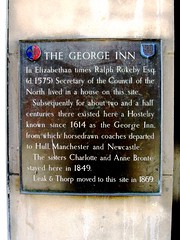Ralph Rokeby Esq
(d.1575)
Commemorated on 1 plaque
The George Inn. In Elizabethan times Ralph Rokeby Esq. (d. 1575) secretary of the Council of the North lived in a house on this site. Subsequently for about two and a half centuries there existed here a Hostelry known since 1614 as the George Inn, from which horsedrawn coaches departed to Hull, Manchester and Newcastle. The sisters Charlotte and Anne Brontë stayed here in 1849. Leak & Thorp moved to this site in 1869.
19 Coney Street, York, United Kingdom where they lived
